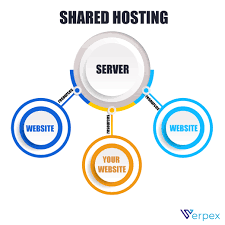Choosing the right hosting solution is a critical decision for any website owner. Shared hosting and VPS hosting are two popular options, each with its own set of advantages and drawbacks. In this article, we will delve into the details of Shared Hosting and VPS Hosting, helping you make an informed decision based on your specific needs and requirements.
Shared Hosting:

Shared hosting is a cost-effective and user-friendly hosting solution, making it an ideal choice for beginners and small to medium-sized websites. In this setup, multiple websites share the same server resources, including CPU, RAM, and disk space. This sharing allows hosting providers to offer affordable plans, making shared hosting an attractive option for those on a budget.
Pros of Shared Hosting:
- Affordability: Shared hosting is often the most budget-friendly option, making it accessible to individuals and small businesses with limited resources.
- Ease of Use: The hosting provider takes care of server maintenance and management tasks, making shared hosting an excellent choice for users who are not tech-savvy.
- Quick Setup: Shared hosting plans usually come with pre-configured settings, allowing users to set up their websites quickly and easily without extensive technical knowledge.
Cons of Shared Hosting:
- Limited Resources: Since multiple websites share the same server resources, heavy traffic or resource-intensive applications on one site can affect the performance of others.
- Less Customization: Shared hosting has limitations on server customization, as users have restricted access to server settings.
VPS Hosting:

Virtual Private Server (VPS) hosting provides a more robust and scalable solution by allocating dedicated resources to each virtual server. This offers more control and flexibility compared to shared hosting, making it suitable for growing websites and businesses with increased resource requirements.
Pros of VPS Hosting:
- Greater Performance: VPS hosting provides dedicated resources, ensuring that your website’s performance is not affected by the activities of other users on the same server.
- Customization: Users have more control over server configurations, allowing for greater customization and flexibility to meet specific website requirements.
- Scalability: VPS hosting allows users to easily scale their resources as their website grows, ensuring optimal performance even during periods of increased traffic.
Cons of VPS Hosting:
- Higher Cost: VPS hosting is generally more expensive than shared hosting, which may be a consideration for budget-conscious individuals or small businesses.
- Technical Knowledge Required: Managing a VPS requires a certain level of technical expertise, which may be challenging for beginners.
Conclusion:
In choosing between shared hosting and VPS hosting, it ultimately comes down to your website’s specific needs and your budget. Shared hosting is a great starting point for beginners and smaller websites, offering an affordable and user-friendly solution. On the other hand, VPS hosting is the go-to option for websites that require more control, customization, and scalability.
Evaluate your website’s current and future requirements, consider your technical expertise, and weigh the pros and cons of each hosting option before making a decision. Whether you opt for the simplicity of shared hosting or the enhanced performance of VPS hosting, selecting the right hosting solution is crucial for the success and smooth operation of your website.


